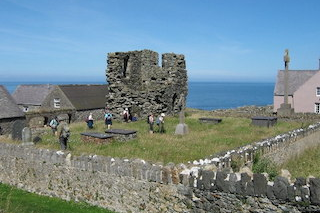Shakespeare's 'eternal summer shall not fade'

National Portrait Gallery
'In eternal lines to time thou grow'st'
Today is the 400th anniversary of Shakespeare's death; and by tradition, it is also his birthday, for he was baptised three days later.
Today is also the feast of St George, England's patron saint. And for generations, this was a happy coincidence for the Protestant imperial establishment who would pay homage to the 'national poet' on this patriotic day.
Recent scholarship has served to disturb this wholesale packaging of an imperialist Bard.
Shakespeare was the scion of a Catholic family and his father in particular paid dearly for his recusancy during the Elizabethan Reformation.
While Shakespeare chose retreat and inwardness regarding his own religious affiliation, his plays contain striking Catholic resonances, references and discourses.
Raging Lear encounters Poor Tom during a storm and becomes a Man of Sorrows, filled with empathy for 'poor naked wretches'. 'Take physic pomp; expose thyself to feel what wretches feel.'
Macbeth was written in the aftermath of the Gunpowder Plot. It is concerned with regicide, massacres of innocents, and duplicity where it is possible to 'palter with a double tongue' and 'lie like truth'. The Jesuits were implicated in the plot and the Porter quips about their leader Fr Henry Garnet who took the sobriquet 'Farmer'. He also jokes about 'equivocation'. The witches ('weird sisters' and 'bearded women') have themselves been cast as Jesuits by one recent scholar. 'The crows fly to the rooky wood'. The Jesuits were demonised as crows in their black garb. Francis Rookwood was one of the Gunpowder conspirators.
The ghost of Hamlet's father can only be Catholic. 'Unhouseled, disappointed, unanneled', he is doomed to dwell in Purgatory. Hamlet, the troubled student from Lutheran Wittenberg ('There are more things in Heaven and Earth Horatio, than you have dreamt of in your philosophy'), jokes about Polonius's corpse, 'A certain convocation of politic worms is e'en at him': a reference to the protestant Diet of Worms.
In Richard III, the royal women take on roles akin to the three Maries who went to the tomb in the Mystery pageants: they prophesy, testify and speak the truth against Richard of York. Shakespeare would have seen the mysteries in Coventry during his youth.
In The Winter's Tale, the sexually paranoid Leontes experiences a 'saint-like contrition'. Having seemingly caused the death of his wife by his tyrannical jealousy, as well as the actual death of his son, he obeys when instructed by the faithful Paulina, 'It is required that you do wake your faith.' Standing in dumb devotion before a statue of his wife, along with his newly found daughter Perdita ('that which was lost is found'), the statue moves. Tears of joy are shed at this resurrection.
In the late 16th-century, appalling iconoclasm was visited upon English churches by Protestant zealots. The liturgy and worship were likewise emptied of a great deal of their sacramental and ritual force.
In Titus Andronicus, Lavinia is raped, her tongue cut out and her hands cut off. Beyond the appalling sexual violence, it is also possible to identify a symbolic reference to the iconoclasm and religious violence of the age.
Thomas Nashe reported that playgoers were frequently moved to tears by the actors on stage. Some of this emotion would previously have been exercised in the ritualised old faith, just as it would have been heightened in the playhouses by Shakespeare's references and allusions to this. Catholicism was one of the wellsprings of Shakespeare's 'brightest heaven of invention'.
Queen Katharine of Aragon receives a martyr's crown in Henry VIII while Shakespeare also pays gracious homage to an infant Queen Elizabeth, over whom a prophecy full of hope is intoned. Henry V invokes the cult of martyr saints (Crispin and Crispian) to bless his Battle at Agincourt, where scars become holy relics and he presides like a priest over a communion with his warriors ('we happy few, we band of brothers').
Of course, seeking to claim Shakespeare as a Catholic playwright in narrow confessional terms is misguided and would lead us down a cul de sac, while of course it is extremely rich in historical and theatre-historical worth.
Nevertheless, to claim Shakespeare's catholic credentials in the sense of his universalism makes great sense. 'All the world's a stage' says Jacques in As You Like It (the melancholic social commentator intoning from Edenic Arden, both Shakespeare's Warwickshire Forest and the Ardennes). Now in this globalised world, never has Shakespeare's theatrum mundi trope rung truer. Shakespeare is adopted, adapted and reworked around the globe, not to mention the Globe.
To take an example dear to my heart, Aimé Césaire, the great Martinican poet and playwright and founder of Negritude, wrote an inspired colonial adaptation of The Tempest called Une tempête, for this was but one colonial storm among many. He engages fully with the original play and such key lines as (about Caliban) 'This thing of darkness I acknowledge mine', and with wit and stirring rhetoric transforms Caliban, the erstwhile 'salvage and deformed slave', into an anti-colonial hero.
As already identified with Lear's conversion above, Shakespeare's own gift of dramatic empathy is huge. He reaches out to the Other in his plays, or rather his characters do this for themselves, for as John Keats acutely observed, Shakespeare has the great gift of 'negative capability'. He does not impose his own authorial voice or viewpoint. Each character speaks from a position of integrity and hence the openness to interpretation which has led to four centuries of exciting experimentation with the great plays. Think of the very titles of the comedies As You Like It, What You Will (aka Twelfth Night).
While there is abundant racism and anti-semitism expressed by certain characters, Desdemona can say of Othello: 'I saw Othello's visage in his mind'. And Shylock of course can shame the anti-semites with his appeal to common humanity: 'Hath not a Jew eyes?' In a fascinating fragment, Shakespeare's contribution to The Play of Sir Thomas More (the fragment exists in his own hand, one of very few examples of his calligraphy), has the chancellor quelling a race riot against migrants on the Ill May Day of 1517.
Shakespeare was all too alive to humanity's predilection for appalling behaviour, impelled by such base urges as lust and lust for power. The nun Isabella chastises Lucifer-like Angelo as 'man, proud man, dressed with a little brief authority,' in Measure for Measure. The history plays deliver an array of arrogant plotters and the odd psychopath, the Vice-like Richard crookback being the most memorable. On his death-bed, speaking like a prophet 'new-inspired', John of Gaunt chastises his nephew Richard II for pawning the country with 'inky blots and rotten parchment bonds'. England, 'wont to conquer others, hath made a shameful conquest of itself.' He cherishes the country as an other Eden, a demi-paradise, a 'precious jewel sent in the silver sea' (a vivid image picked out in miniature in the Wilton Diptych, where a tiny image of England is so illustrated).
Many say that Shakespeare, writing for male-only companies and notably for boy actors, loses out to Middleton with his female roles. Yet Lady Macbeth, Margaret of Anjou, Goneril and Regan, Cleopatra and several other parts are superb, not least the delightful Rosalind from As You Like It.
Her wit and delight in play are yet other key elements in Shakespeare's arsenal of invention. This playfulness and joie de vivre is shared by Puck, various lovers and the denizens of Merry England, notably that old Satan, Sir John Falstaff, himself.
Finally, Shakespeare's language is to be treasured as riches fineless. The plays, the parts, the plots, the words, are indeed 'such stuff as dreams are made on'. My own love of Shakespeare first came thrillingly when, aged seven, I saw my mother play Titania in A Midsummer Night's Dream at the King's Theatre, Southsea. Shakespeare's 'eternal summer shall not fade'.
Dr Philip Crispin is a Lecturer in Drama at the University of Hull


















